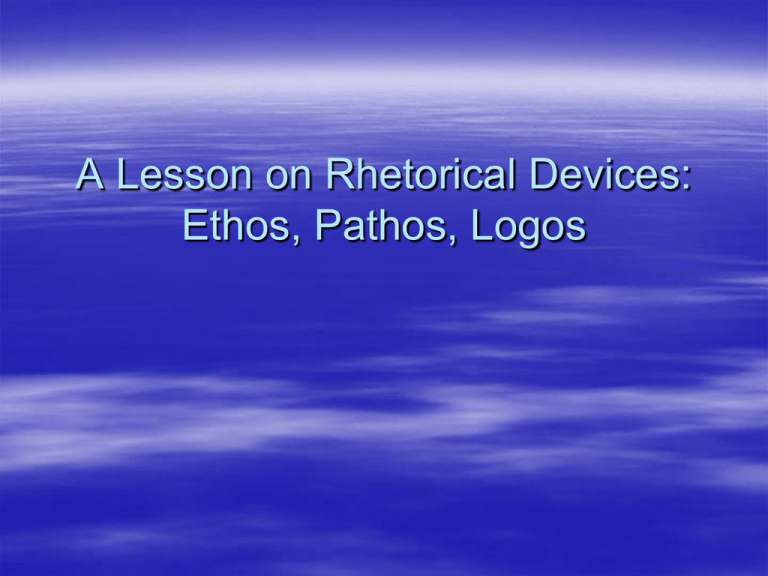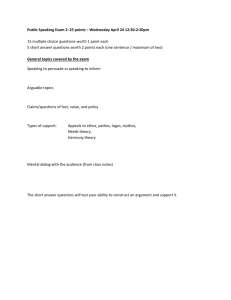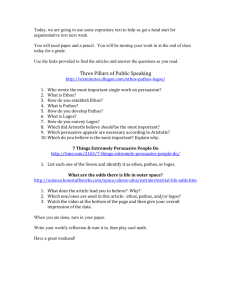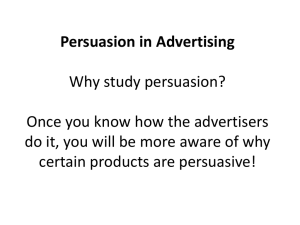File
advertisement

A Lesson on Rhetorical Devices: Ethos, Pathos, Logos What is Rhetoric? Rhetoric (n) - the art of speaking or writing effectively (Webster's Definition). – According to Aristotle, rhetoric is "the ability, in each particular case, to see the available means of persuasion." He described three main forms of rhetoric: Ethos, Logos, and Pathos. In order to be a more effective writer, you must understand these three terms. You will better understand their meanings which will make your writing more persuasive. Three Forms of Rhetoric… Ethos Logos Pathos Ethos (Credibility) Ethos: the source's credibility, the speaker's/author's authority We tend to believe people whom we respect. One of the central problems of argumentation is to project an impression to the reader that you are someone worth listening to, in other words making yourself as author into an authority on the subject of the paper, as well as someone who is likable and worthy of respect. Ethos Example: Product: George Foreman and his Grilling Machine Repertoire: Boxing Champ and a Preacher Why is George Foreman credible? Logos (Logical) Logos: the logic used to support a claim (induction and deduction); can also be the facts and statistics used to help support the argument. – Persuading by the use of reasoning. – An effective and persuasive reason that supports your ideas. Logos Example: Verizon advertises their product by insisting that their customers have 50% fewer dropped calls Or Their 4G network covers 75% more area than AT&T Pathos This is an appeal to emotion. – The emotional appeal can be connected to positive or negative emotions (love, fear, anger, happiness, grief, etc.) Logos Example continued… Few of our children breathe fresh air in their schools, which are being sprayed, inside and out, with millions of pounds of deadly, nervous system destroying pesticides. What are the details provided in this claim? Pathos (Emotional) Pathos: persuading by appealing to the reader's emotions. Emotional appeals, are used to persuade. Language choice affects the audience's emotional response, and emotional appeal can effectively be used to enhance an argument. How? Anecdotal writing or narratives within persuasive writing Pathos Example: How does this advertisement appeal to emotion? Why? Pathos Example continued… Weak America? That’s awful! Look at those sweet, homeless, little bears! Someone ought to be ashamed of themselves! Quick Recap Ethical. “Because this is correct”. Emotional. “Because it’s what your heart demands” Rational. “Because it’s reasonable” (Logos)- Logical Fallacy Ad hominem: This is an attack on the character of a person rather than their opinions or arguments. Example: – Green Peace's strategies aren't effective because they are all dirty, lazy hippies. In this example the author doesn't even name particular strategies Green Peace has suggested, much less evaluate those strategies on their merits. Instead, the author attacks the characters of the individuals in the group. There are many types of logical fallacies: Slippery Slope: If “a” happens….”z” happens Post hoc ergo propter hoc: if 'A' occurred after 'B' then 'B' must have caused 'A.‘ Genetic Fallacy: This conclusion is based on an argument that the origins of a person, idea, institute, or theory determine its character, nature, or worth Loaded Language Loaded Language The term "loaded language" refers to words, phrases, and overall verbal and written communication that is intended to inspire emotion in the reader or listener. This usage of language to appeal to emotion is used in everyday conversation and is often used by politicians, public figures, advertisers and corporations. Loaded language is considered a persuasive technique and has also been called emotive language, high-inference language, or loaded terms. It is often used in order to: Gain support Sway opinions Degrade others (such as in a political campaign) Gain a political foothold Push an agenda Some have even claimed that the use of loaded language is a brainwashing technique. – The noted writer George Orwell in discussion of using loaded language had this to say: "The word Fascism has now no meaning except in so far as it signifies 'something not desirable.' The words democracy, socialism, freedom, patriotic, realistic, justice have each of them several different meanings which cannot be reconciled with one another. In the case of a word like democracy, not only is there no agreed definition, but the attempt to make one is resisted from all sides. It is almost universally felt that when we call a country democratic we are praising it: consequently the defenders of every kind of regime claim that it is a democracy, and fear that they might have to stop using that word if it were tied down to any one meaning." Often, loaded language exists as a substitute for other words or phrases, one more negative or positive than the other depending on circumstance. Bureaucrat vs. public servant Pro-death vs. pro-choice Regime vs. government Elitist vs. expert Infanticide or child murder vs. abortion Put up with vs. tolerate Put at a loss vs. bewilder Loaded language can create an emotional image that is different in each person, based on their experiences and beliefs.




